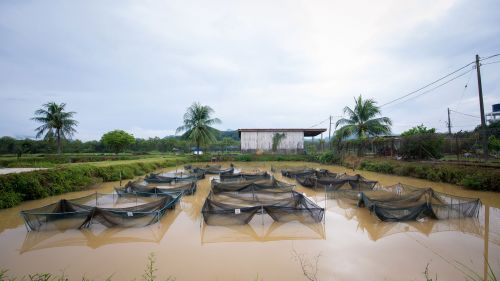Finding an Alternative to Fishmeal for Sustainable Aquaculture in Zambia

Replacement of fisheries-derived fishmeal with yeast-derived proteins, or single-cell proteins, could support the sustainable growth of aquaculture globally.
Fishmeal and Single-Cell Proteins
Fishmeal is a fisheries-derived product that is used as a protein source in the diet of farmed animals, including farmed aquatic animals (finfish and shellfish). Aquaculture is currently the main consumer of the global fishmeal production. Given the sustainability concerns inherent to fishmeal production, it is necessary to find alternative protein sources, which will substitute fishmeal, in order to support the sustainable growth of aquaculture globally.
Several ingredients are currently considered as alternatives to fishmeal in fish diets, including plant-based proteins (soybean meals, sunflower meal, etc.), animal-based protein sources (blood meal, poultry meals, insect meals, etc.), microbial biomass meals, and dry yeast products. Dry yeast protein are also called single-cell proteins (SCPs). The dry yeast product DY-Pro, which is produced by the American company Meridian Biotech in the state of Texas in the US, is obtained from Saccharomyces cerevisiae. DY-Pro has been used to replace 100% of fish hydrolysate in a Zebrafish Danio rerio diet. However, this “novel” ingredient has not yet been tested in tilapia, which is the most widely farmed fish group and the second most farmed fish group by volume globally.
The objective of this research is to investigate the effect of partially or totally replacing fishmeal by DY-Pro, in a tilapia Oreochromis niloticus diet. This study will lead to the estimation of the optimum level of substituting fishmeal with DY-Pro in tilapia diets. By reducing the fishmeal level in tilapia diet, it is anticipated that DY-Pro will contribute to the global efforts aiming at decreasing the pressure on wild fish catches to produce fishmeal. Precisely, the research will be conducted at a vocational college, the Natural Resource Development College (NRDC) in Lusaka, Zambia.
This research is part of an ongoing project of the Feed the Future Innovation Lab for Fish (Fish Innovation Lab), which is funded by the U.S. Agency for International Development. The Fish Innovation Lab is managed by Mississippi State University in the US, with managing partners at RTI, International, Texas State University, University of Rhode Island, and Washington University in St. Louis.
The SCP project aims to bring together partners from the academic, research, development, public, and private sectors to implement research and development activities that will not only propose a solution to a global aquaculture problem, but also build the capacity of the local vocational institution (NRDC). This project is currently being implemented in Zambia, in Southern Africa, where tilapia plays a crucial role in animal protein supply of the urban and rural populations. Findings from this study will thus have direct application in the aquaculture industry of Zambia, and can be scaled up in the Southern African Development Community (SADC) region.
To achieve these goals, the SCP project partners include WorldFish (Malaysia and Zambia Offices), Texas A&M University (USA), Mississippi State University (USA), Meridian Biotech (USA), NRDC (Zambia), Aller Aqua (Zambia), and Yalelo Ltd. (Zambia). The phases in the implementation of the project include the design and building of a research facility at NRDC and the training of two employees of NRDC on applied aquaculture research and the operation of a research facility.
Considering the fast global growth of the aquaculture sector, it is imperative to find sustainable alternatives to fishmeal. The achievement of this project will not only suggest a solution in this regard, but will also build the infrastructural capacity and the human capital in a vocational college in Zambia, for future training opportunities within the college and for the completion of future applied research activities aiming at finding solutions to both local and global aquaculture problems.
Field Notes
The Chicago Council on Global Affairs is pleased to launch a new blog series, "Breaking Ground," to explore how food systems innovation and agricultural research and development can empower farmers and feed the world. A special subsection of this series, "Field Notes," features voices from Feed the Future Innovation Labs and CGIAR centers.